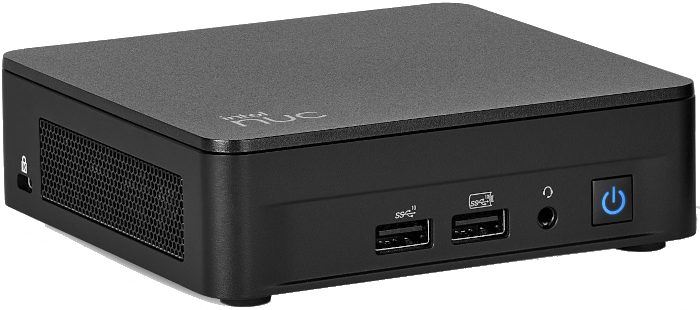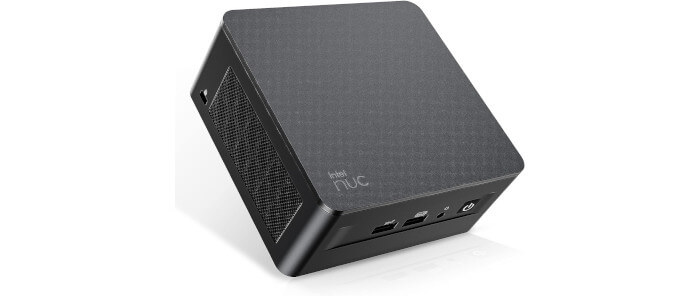This is a multi-part blog looking at an Intel NUC 13 Pro Mini PC running Linux. In this series, we examine every aspect of this Mini PC in detail from a Linux perspective. We’ll compare the machine with modern desktop PC counterparts along the way.
This machine is sold by GEEKOM, a leading and respected brand and manufacturer of Mini PCs. They provide a 3 year warranty on their Mini PCs.
The Intel NUC 13 Pro Mini PC (“NUC 13”) is available in a variety of configurations. GEEKOM supplied the machine with an Intel i7-1360P processor which has 12 cores, 16 threads. The CPU has 4 performance cores (8 threads) and 8 efficient cores. Performance cores maximize single-thread performance and responsiveness, while efficient cores offer scalable and efficient offload of background tasks for modern multi-tasking.
The machine is paired with a 1TB M2. NVMe SSD and 32GB of DDR4 RAM. There are two memory slots with both populated in our configuration. The machine can take a maximum of 64GB of DDR4 RAM. If you need 64GB RAM, there’s a barebones version which you can add your own 2×32 GB memory.
Design
One of the most challenging parts of having a traditional desktop setup is finding space for the base unit, the monitor, and all the wired/wireless extras. Mini PCs take up minimal space. Some can be mounted at the back of a monitor, others will fit on even the smallest desks.
The diminutive NUC 13 has dimensions of 117 x 112 x 38mm. It comes with a mounting bracket to attach the machine to the back of a monitor. Other advantages of its diminutive size are portability, its lightweight, and fits the aesthetic appeal of even the most minimalist designer.
A major disadvantage of many Mini PCs is their limited expansion capability. Their small size often means that the machine cannot be upgraded or the options are very limited. That isn’t the case here.
The front of the machine offers 2 USB 3.2 ports and a 3.5mm audio port.

The NUC 13 also features two HDMI 2.1 ports, two Thunderbolt 4 ports (USB Type-C, also compatible with DisplayPort 1.4). This means the machine can host 4 monitors. Besides display flexibility, Thunderbolt 4 ports have a 40Gbps (gigabits per second) bidirectional bandwidth, and are compatible with many connection standards, including previous versions of Thunderbolt, USB (including USB 4.0), DisplayPort, and PCle. The latter lets you connect external graphics card and video capture devices for live-streaming gameplay.
At the rear, there are a 2.5Gb LAN port and two further USB ports (one USB 3.2 and one USB 2.0). The Mini PC also offers 7.1 digital audio output for a rich and immersive sound experience, but you’ll need a capable AV Receiver to connect your speakers for this functionality.

The case has grills on the side to source fresh area with warm air air expelled through slots along the top rear edge.
In addition to the 22×80 M.2 NVMe slot for PCIe Gen 4 modules, dual DDR4-3200 SO-DIMMs, there’s an M.2 22×42 key B slot for PCIe x1 Gen3 modules. A header for SATA is present, but the Slim version of the case doesn’t have the physical space to install the drive.
Is the mini PC quiet? With the machine idle, the machine is audible from 1 metre away but its extremely quiet. We’re a real stickler when it comes to fan noise. With the machine under full load, the fan does ramp up, as expected. Keeping a Mini PC cool under full load with a fairly powerful processor is never going to be a quiet affair.
On the next page we use the inxi utility to drill down in more detail.
Next page: Page 2 – Specifications
Pages in this article:
Page 1 – Introduction
Page 2 – Specifications
Complete list of articles in this series:
| Intel NUC 13 Pro Mini PC | |
|---|---|
| Part 1 | Introduction to the series with interrogation of system |
| Part 2 | Benchmarking the Mini PC |
| Part 3 | Installing Ubuntu 23.10 Desktop |
| Part 4 | Configuring Ubuntu 23.10 Desktop |
| Part 5 | Power Consumption |
| Part 6 | P-Cores and E-Cores |
| Part 7 | Gaming |
| Part 8 | Installing and Configuring Manjaro |
| Part 9 | BIOS options |

What’s in store for the series?
I’m currently drafting a whole raft of articles with benchmarking to be published tomorrow. Other articles will include power consumption, installing and configuring various Linux distributions, gaming, and some techy articles such as looking at the P-Cores and the E-Cores.
Happy to receive suggestions for other topics to cover.